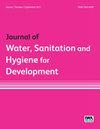“有水可用,所以我们的心是和平的”:探索获得安全用水对加纳妇女主观幸福感的影响
IF 1.4
4区 环境科学与生态学
Q3 WATER RESOURCES
Journal of Water Sanitation and Hygiene for Development
Pub Date : 2023-08-23
DOI:10.2166/washdev.2023.142
引用次数: 0
摘要
直到2018年,非政府组织“国际需要加纳”(International Needs Ghana)将管道供水扩展到这两个社区,来自Kordorwukope和Gbegbevia的妇女不得不跋涉约2公里才能获得安全用水。自从向社区提供水以来,没有进行任何研究以确定获得安全水对生活在这些社区的妇女的福利的影响。因此,这项研究的目的是探讨实际获得安全用水对生活在Gbegbevia和Kordorwukope社区的妇女福祉的影响。采用质性研究设计。研究人群包括7名妇女,她们在水项目实施前已经在研究社区生活了至少2年。数据显示了五个关键主题:妇女在获得安全用水之前面临的挑战;身体健康;心理健康;社会福利;以及职业和财务状况。本研究结果显示,自来水延伸至研究社区后,研究社区妇女的身体、心理、社会、事业和财务状况均有显著改善。本文章由计算机程序翻译,如有差异,请以英文原文为准。
‘There is water available and so our hearts are at peace’: exploring the impact of access to safe water on women's subjective well-being in Ghana
Women from Kordorwukope and Gbegbevia had to travel about 2 km to access safe water, until 2018 when International Needs Ghana, a Non-Governmental Organisation, extended piped water to each of the two communities. Since the extension of water to the communities, no study had been carried out to ascertain the effects of access to safe water on the well-being of women living in those communities. This study therefore aimed at exploring the effects of physical access to safe water on the well-being of women living in the Gbegbevia and Kordorwukope Communities. A qualitative research design was used. The study population included seven women who had lived in the study communities for at least 2 years before the water project was implemented. Five key themes were apparent in the data: challenges women encountered before gaining access to safe water; physical well-being; mental well-being; social well-being; and career and financial well-being. The results of this study show that the extension of piped water to the study communities brought about significant improvement in physical, mental, social, career, and financial well-being of women in the study communities.
求助全文
通过发布文献求助,成功后即可免费获取论文全文。
去求助
来源期刊

Journal of Water Sanitation and Hygiene for Development
WATER RESOURCES-
CiteScore
3.10
自引率
11.80%
发文量
58
审稿时长
16 weeks
期刊介绍:
The Journal of Water, Sanitation and Hygiene for Development is a peer-reviewed journal devoted to the dissemination of high-quality information on the science, policy and practice of drinking-water supply, sanitation and hygiene at local, national and international levels.
 求助内容:
求助内容: 应助结果提醒方式:
应助结果提醒方式:


